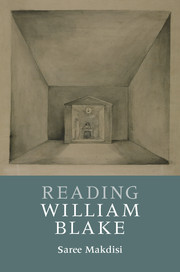4 - Joy
Published online by Cambridge University Press: 05 May 2015
Summary
It is clear enough, as we saw in Chapter 2, that there is something dangerously villainous about those priests in black gowns walking their rounds and binding with briars my joys and desires in “The Garden of Love.” But it is worth asking what the opposite of such binding would amount to. What would the flourishing of desire look like? What I want to suggest in this chapter is that we can understand joy, in Blake's work, as just such a flourishing. In order for us to appreciate the significance of this, however, we have to bear in mind what desire means in Blake's work, and to recall the important differences – covered in Chapter 3 – between what has become the conventional understanding of desire (tending toward the selfish and the possessive) and the more unusual meaning of desire that we see at play in Blake's work.
For what we saw in the previous chapter is that in Blake's work desire is tied up with being: the more bound and restricted my desires, the less being I have; whereas the more expansive my desires and my connections to others, the more I exist – ultimately as a common participant in God, the “Divine Body,” as Blake put it, of which “we are his members.” The question of the expansion and contraction of being is vital here because it reminds us that being in Blake is, or, rather (provided we can escape the clutches of Urizen, nurses, teachers, priests, and so on), it ought to be, open-ended, rather than fixed and solitary, contained within and defined by one single constant form. We might say that we exist in, and as, a cluster of relations, a network: the more the elements of that network, and the greater their variety, the more being we have. What is at stake here, then, is the ability to flourish by endlessly changing, shifting, and connecting with others; to be both the same and different as we change; indeed, to maintain a sense of unity with – rather than at the expense of – difference.
Information
- Type
- Chapter
- Information
- Reading William Blake , pp. 68 - 81Publisher: Cambridge University PressPrint publication year: 2015
